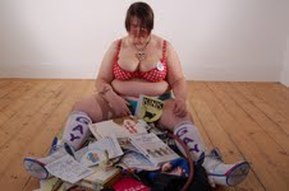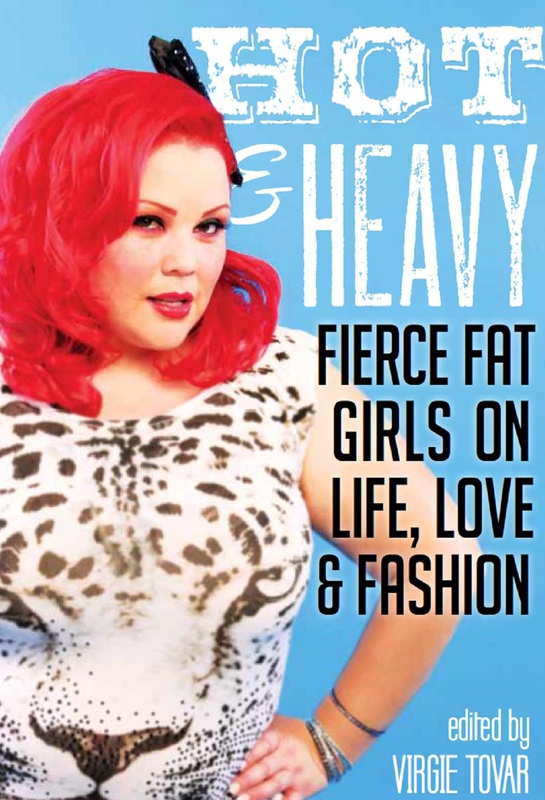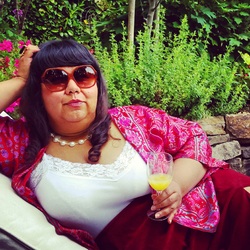 Charlotte Cooper is a contributing author to the fat positive anthology Hot & Heavy: Fierce Fat Girls on Life, Love and Fashion. This piece is part of the one year anniversary of Hot & Heavy's release. Claiming Fat Power
I wrote my piece for Hot & Heavy at a point when I was really feeling my power as a public fat person. I was doing some interesting projects, I had a secure income for a period of time, and was embroiled in an academic project, a PhD, that I hoped would bring me status and employment. Things sort of went the way I wanted them to in the intervening period, but it's been a bumpier ride than I imagined. I got my doctorate and struggled, as everyone who does this kind of thing struggles, with getting it finished in a timely manner. My Dad died suddenly but not unexpectedly a month before I submitted my thesis. Pow. I saw a bereavement counsellor who helped me through the immediate aftermath of losing Dad and the then forthcoming loss of my identity as a researcher within an academic department, and the loss of my scholarship income as the programme ended. She reminded me that I have power and resources, and that I should use them. I took her seriously. I decided that, for now, the academy is not the place where I want to focus my attention. I found out that a PhD sounds fancy but doesn't guarantee a good job. I started to find out more about the Para-Academy, a body of work and activism that seeks to undermine the elitism of knowledge production in universities. I started to think more critically about what it meant to be part of an institutional knowledge machine, and especially about how I might make anti-oppressive work, particularly within Fat Studies. I started to build on an idea called Research Justice, which is a way of doing research that puts people who are usually marginalised by research at the centre of things. I designed a couple of small research justice projects, one about how fat activists experience being stitched-up in the media, and another about fat people and their resistance to institutional violence. This helped me to think about where I might take my academic training, it opened up new possibilities. I returned to Plan A, which was to set up business as a psychotherapist. I started working with clients who wanted to talk about themselves in relation to politics, their bodies, oppression, agency. Some of my clients were and are fat people who need a non-judgmental space to explore what that means. It felt amazing to be able to channel some of my experience into this work. I have big ideas for developing this service and for thinking about how fat activism might generate ways of supporting people's mental health. There is so much to do! Some unexpected things came up: invitations to speak, performances with a band, films. I got invited to be a columnist at DIVA magazine, where I write about queer identity and fat. I was joined the board of ScotteeInc, a charity supporting queer fat performance. I produced a wigged-out event called the Fattylympics. I produced some fact sheets for an LGBT health organisation about fat. I started the process of publishing my thesis in a way that would help the most people. Nothing was secure or certain, but the work continued. When I think about body love, which is admittedly not very often, I think about where my fatness has taken me (towards some of the things that I have described above, for example). If I had lived a life of trying to deny my body or making it into something else, I would not have the riches that I currently enjoy with regards to work, community and creativity. My sense of valuing myself as a fat person is not limited to whether I can tolerate looking at, feeling, or knowing my own body; it's about claiming power and, as far as I can, using that power ethically for the good of all beings. Hot & Heavy was not the first time that I have published work relating to fat, in many ways I am an old hand at this. The anthology Shadow On A Tightrope was the first book that really politicised me about fat, and I'm sure Hot & Heavy will do that for others. I value both books because they represent a collective moment. This breaks down the idea that the movement is merely a platform for some (inevitably white, middle class, urban North American, 'exceptional') high profile people or celebrities who have managed to capitalise on the beautiful and wonderful idea that fat is not such a terrible thing to be after all. Hot & Heavy shows that there are many of us thinking about this stuff and mobilising around it in our own ways. I want to keep that in mind, and encourage others to do so too, to claim our own spaces, and to know that fat power is for everyone. Charlotte Cooper 11 September 2013 Read Charlotte's chapter, "Hey Sister, Welcome to my World!," & support fat positive community and literature by purchasing a copy of Hot & Heavy and by liking us on Facebook!
Jay
1/13/2014 11:23:15 pm
It's good you love yourself and your body. Seriously. And for what little its worth, I like your writing (what I've read) and you seem pretty awesome. But at the end of the day no matter how you wrap it up, spin it, proselytize, and try to justify it, being very heavy is simply not a healthy state to be in. Generally we want to be alive for as long as we can and being fit improves our chances. Being fit includes, by all reasonable measures, a properly balanced diet and regular exercise; the side effect of which is weight loss and an increase in positive energy and many other good things. Deciding not to be fit is a choice, however, and you have every right to stand by that choice. Comments are closed.
|
Virgie Tovar
Virgie Tovar, MA is one of the nation's leading experts and lecturers on fat discrimination and body image. She is the founder of Babecamp (a 4 week online course focused on helping people break up with diet culture) and the editor of Hot & Heavy: Fierce Fat Girls on Life, Love and Fashion (Seal Press, 2012). She writes about the intersections of size, identity, sexuality and politics. See more updates on Facebook. Archives
April 2021
Categories
All
|




 RSS Feed
RSS Feed